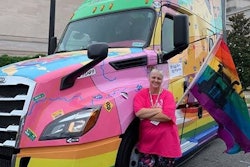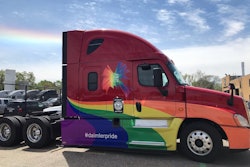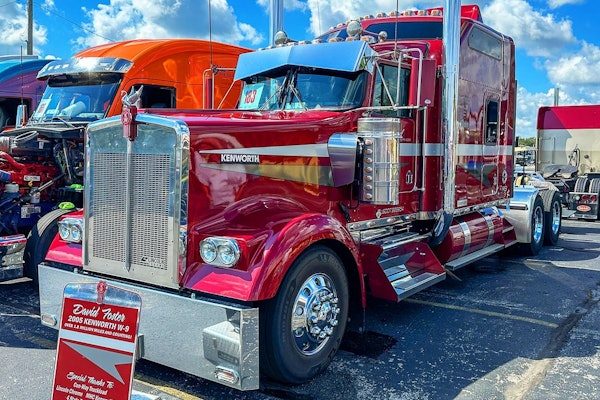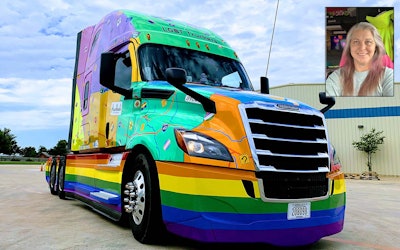 Shelle Lichti (top right), founder of a support group for LGBTQ truckers, is known for her rainbow-themed company truck, dubbed Rainbow Rider.
Shelle Lichti (top right), founder of a support group for LGBTQ truckers, is known for her rainbow-themed company truck, dubbed Rainbow Rider.“I’m trans,” said Kristin Durh to the recruiter lining up her orientation schedule. She had to take a deep breath before telling him what she was pretty sure he already had figured out.
As a transgender woman, she was used to the ways companies filtered out her application once they spoke to her. That’s why, when she was finalizing details for orientation at Autumn Transport, she decided to inform her recruiter. To her amazement, the recruiter replied, “Oh, OK. Can you start on Monday?”
Julie Andrich, president for Woodbury, Minnesota-based Autumn Transport, says the decision to lease Durh and her 2015 Freightliner Coronado was based purely on Autumn’s standard criteria: driving record, pre-employment screening program, work history and safety record. But in Durh’s case, comments from her previous employer were icing on the cake. They praised her work ethic and said, “We will miss her.”
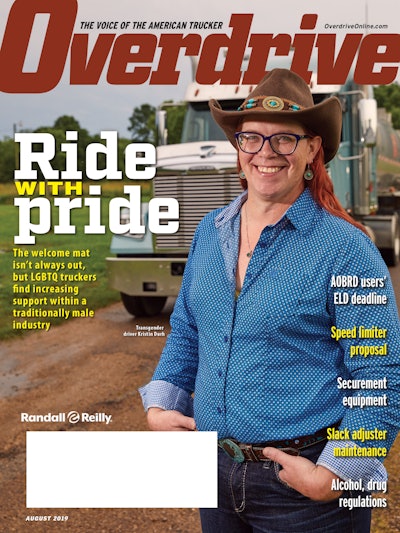 Kristin Durh was featured on the cover of Overdrive’s August issue.
Kristin Durh was featured on the cover of Overdrive’s August issue.“That’s unusual for our industry,” Andrich says. “We knew we were hiring a great operator.”
The openness of the lesbian-gay-bisexual-transgender-queer (or questioning) community has increased in trucking, as it has elsewhere, in recent years. There are signs of tolerance in major sectors of the industry – fleets, truck stops and truck makers – and in some cases active endorsement of diversity in sexual identity.

At the same time, gay and trans women truck drivers often struggle with hatred, prejudice and violence, says author Anne Balay. She was briefly a trucker before writing “Semi Queer: Inside the Lives of Gay, Trans, and Black Truck Drivers.” Balay, who teaches at Haverford College in Pennsylvania, estimates that LGBTQ drivers account for nearly 10% of all truckers.
Shelle Lichti founded the industry’s largest online support group for LGBTQ truckers in 2008 to honor a close, gay trucker friend who was gang-raped and committed suicide. She says the nearly 4,000 members of the Facebook group, LGBT Truckers, offer support, tips and a safe place to talk about the gay bashing that many endure.
“I wanted to create a group where we could collaborate on ways to keep this from happening to other queer truckers,” says Lichti, who’s been trucking for more than 25 years, the past 11 for Hirschbach Transportation, located in Dubuque, Iowa.
Lichti spent her own funds on the colorful graphics for Rainbow Rider, a company truck. It even has its own social media following, including a Facebook group. Lichti says the truck’s been vandalized, something that’s been classified as a hate crime. “We have cameras, but still, trucking with a Pride theme truck is like a giant target,” she says. “It’s great for awareness, but it’s also a little scary.”
Lichti has been tapped by Uber Freight to represent her community at pro-LBGTQ events, but even so, she has her moments of discouragement. “I’ve been accused of being a lot lizard and other things. It’s always a struggle.”
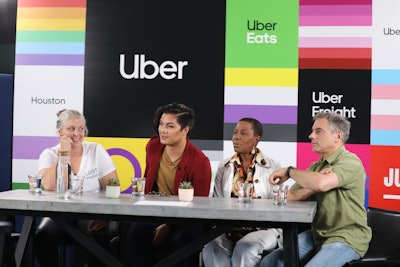 LGBTQ truckers shared their stories as part of a Houston Pride Panel hosted by Uber Freight this summer. From left are support group founder Shelle Lichti, Michael Savino, Georgie Oliver and Marcus Raye Pérez.
LGBTQ truckers shared their stories as part of a Houston Pride Panel hosted by Uber Freight this summer. From left are support group founder Shelle Lichti, Michael Savino, Georgie Oliver and Marcus Raye Pérez.Durh, 40, who came out in January 2015, appreciates the respect she’s found at Autumn. Everyone there treats her kindly and uses her preferred pronouns. She’s also aware that while trucking gradually has become more accepting of the LGBTQ community, a sense of fear still permeates the trucking life of most who are “out.” “You can’t ever let your guard down,” she says.
While Durh’s coming out has been recent, Roni Hazel Sherman, 67, began transitioning to female 10 or 12 years ago. “At the age that I am, coming out when I did, I don’t think I was much of a threat to people, like a younger person would be,” she says.
Sherman lives near Binghamton, New York, and is leased to Behne Inc., based in Sherburn, Minnesota. She’s been told of comments made behind her back, but “I don’t pay attention to it. I’m hard of hearing for one — maybe that’s a blessing. I don’t see it, don’t hear it. Every once in a while, I’ll catch someone. I’ll pick on them: ‘Something wrong?’ I’ll kind of bust their chops a little bit in a lighthearted way.”
She sometimes gets sincere questions from others about her sexual identity, which she’s happy to answer as best she can. Even after a decade as a woman, Sherman admits, “Hell, I don’t understand it.”
Before her transition and formal name change, she was Ronald Harold Sherman. “It got to a place where something was messed up with me my whole life. I would repress it, it would go away, but it would come back stronger and stronger every time. I either had to end it or fix it.”
As a Vietnam veteran, she was able to get counseling through the U.S. Department of Veterans Affairs. “I had some mental health counselors who went above and beyond in helping me to get into a support group.”
Beyond the acceptance drivers like Sherman and Durh have found at certain fleets, many LGBTQ drivers express appreciation for the opportunities that are common to over-the-road trucking, especially in light of the sexual-identity prejudices that exist in many workplaces. The protection that comes from feeling powerful behind the wheel, operating in relative isolation and working in a field with high demand for skilled drivers are positive reasons to continue trucking, Balay says.
“How you dress or present yourself is not necessarily a barrier to trucking jobs in contrast to other industries,” Balay says. “Many find that trucking gives them the opportunity to feel useful while keeping a low profile.”
Next in this series: Acceptance increasing, but LGBTQ truckers still face danger, rejection at truck stops

